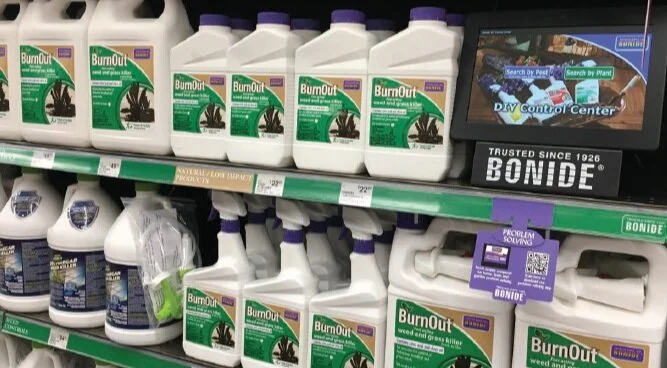Organic Sales Bloom
Maine retailers meet growing demand for natural lawn and garden products
Emily Hyman, who works as a grower at Skillins Greenhouses, waters primroses at the store in Falmouth. Skillins uses biological controls, such as beneficial insects, to prevent pest damage in its greenhouses, and in the past 10 years has shifted most of its lawn and garden products to organic. Photo; Avery Yale Kamila.
By Avery Yale Kamila
TERRY SKILLIN enjoys when customers bring bugs into the store.
“It happens quite often,” says Skillin, who is president of Skillins Greenhouses. “They bring in insects to ask what they are.”
After more than 45 years in the greenhouse business, Skillin has learned not to judge bugs by their looks, saying, “Some beneficials look terrifying, such as ladybug larvae. It looks like an insect you don’t want in your garden.”
But you do. Ladybugs eat plant munching aphids, while ladybug larvae also eat white flies and mites.
When someone does turn up with an insect specimen that can damage plants and reports a major infestation, the Skillins staff directs customers to organic control options. That’s because Skillins, like a growing number of Maine retailers, has shifted its lawn and garden products toward organic and away from conventional pesticides and fertilizers.
“For the last 10 years, organics have really been building in our stores [in Falmouth, Cumberland and Brunswick]”, says Skillin. “We’ve always been looking for something that was more earth-science-smart, so to speak.”
Organic gardening and lawn care involve much more than applying natural bug repellents and insecticides.
The focus of organic lawn care is nurturing soil microorganisms by providing the elements they need to thrive. This has led to new products on store shelves, from bags of compost to amendments such as humic acid, mycorrhizal fungi, biochar, alfalfa meal and seaweed extracts.
Organic lawn care also calls for cultivating plants to attract beneficial insects who prey on pests, provide pollination services and serve as food for birds. Organic also relies on a range of tools, including lawn aerators, weeding shovels and compost tea brewers.
At Maine Hardware in Portland, store manager Tim Currier talks about the organic lawn and garden products the store sells now that’s it’s moved away from synthetic pesticides and fertilizers. Photo: Avery Yale Kamila.
At the family-run Skillins Greenhouses, which have been in business since 1885, Skillin says, “Most of us have some level of science education and we realized some of this stuff is so much better in the long run. That made us really start expanding the organic line.”
At Maine Hardware in Portland, the lawn and garden product mix started changing in 2019.
“We got rid of all our Roundup and GroundClear,” manager Tim Currier says, referring to the brand names of two synthetic weed killers formulated with the controversial herbicide glyphosate. “We just made a stance. I realize we can sell it, but I’m already out, and I’m not going back.”
Earlier this year, Maine Hardware dropped all its synthetic weed-andfeed lines (often sold in bags as a multistep program) and is instead carrying new products such as Jonathan’s Green organic weed and feed line and more Coast of Maine composts and fertilizers.
“We’ve never been a huge destination for lawn and garden,” Currier says, “but I’m hoping to get more sales with the organic products.”
That’s what happened at Eldredge Lumber & Hardware. In 2014, Eldredge cut synthetics and switched to organics, causing sales in the lawn and garden department to grow 30 percent. The following year, a group of environmental nonprofits recognized Eldredge for its embrace of organic, which triggered a wave of publicity and more customers.
“People would read about us going organic… and they’d come in and buy a beach chair,” says John Bochert, organic lawn and garden specialist at Eldredge Lumber & Hardware, which has stores in York, Kittery and Portland, with another planned for Sanford.
After Reader’s Digest wrote about the store’s decision to go organic, Bochert started getting “calls from people in Indiana and South Carolina who wanted advice about organic.” Bochert helps educate the out-of-state callers along with store customers, staff and anyone else who seeks advice.
PHOTO COURTESY OF ELDREDGE LUMBER
CHANGE DRIVERS
Amy Berger, who manages the Paris Farmers Union store in Raymond, says customers come in looking for organic options and these days “people are more open to trying things.”
Berger attributes a significant portion of this openness and interest in organic to the number of lakefront properties in the Raymond area and local awareness of water pollution caused by synthetic lawn fertilizers and pesticides.
“The younger crowd’s first thought is to go organic,” Berger says. “Another piece that plays into it is marijuana growers, who grow at home and don’t want to put chemicals in their body. Also, more people are doing small gardening, so practicing organic is easier.”
Paris Farmers Union has nine stores across Maine and one each in New Hampshire and Vermont, and all the stores stock a full range of organic products.
In Maine, another factor driving demand for organic products is the growing number of ordinances passed by towns and cities to restrict pesticide use. Close to 30 Maine municipalities have pesticide ordinances on the books, and three – Portland, South Portland and Oqunquit – are among the strongest in the nation, requiring organic practices on both public and private property.
Currier at Maine Hardware said the passage of the ordinances in Portland and South Portland prompted the changes in the lawn and garden department. Bochert at Eldredge said it was Ogunquit’s adoption of an organic ordinance that nudged owner Scott Eldredge to stop selling synthetics.
Turns out, these retail moves align with Maine values.
Maine is home to the nation’s oldest and largest organic farming organization, the Maine Organic Farmers and Gardeners Association. Known as MOFGA, the group numbers more than 11,000 members and certifies 535 producers, whose sales rose 62 percent between 2012 and 2019, reaching $60 million.
Earlier this year, Physicians for Social Responsibility Maine Chapter released polling data revealing 72 percent of Maine voters have concerns about pesticide exposure and 71 percent support the pesticide bans adopted by towns and cities.
Organic-approved products line the shelf at Eldredge Lumber and Hardware in Portland, where an interactive display offers advice on how to control unwanted plants and insects. Eldredge began to phase out synthetic pesticides in 2014. PHOTO: AVERY YALE KAMILA
HOW TO GO ORGANIC
While it’s clear many Maine people want to care for their properties organically, moving from conventional to organic is not a simple product swap. Not only are the products different, but pesticides are not a focus of organic care, particularly when maintaining ornamental landscapes. If and when pesticides are applied, it’s often not done the same as synthetic applications.
For instance, many organic pesticides rely on predatory insects, bacteria or microorganisms, which must be stored, handled and applied differently than chemical sprays.
Both Skillins Greenhouses and Eldredge Lumber, which operates two greenhouses at its York store, use biological controls rather than synthetic insecticides in their greenhouses. Even so, neither company is able to meet all the demand at their stores for plants grown without synthetic pesticides.
“We sell an incredible amount of flowers, and it’s been difficult to supply the demand [for organic],” Bochert says. “We’ve found some farmers through MOFGA who can provide organic plants. It’s hard to get commercial plants, especially flowers, that are certified organic.”
Skillin said there is more awareness among the large commercial growers of the public’s concerns about pesticides, but he agrees none are selling certified organic plants.
“Some certify as ‘pollinator safe’ meaning they’re not using systemic pesticides,” Skillin says. Systemic pesticides, such as the controversial class of synthetic pesticides known as neonicotinoids, make the plant itself toxic, killing insects (including beneficials) that feeds on the plant.
Lawns are another area where going organic means changing practices.
Organic fertilizers don’t release nutrients into the soil as quickly as synthetics do, so must be applied differently. As with pesticides, fertilizers are just one option in the organic lawn tool kit. Other organic techniques for building soil fertility under lawns include over-seeding with white clover, top-dressing with compost, applying humic acid, manually aerating, mowing grass no lower than three inches high, and letting clippings and leaves decompose on the lawn.
To help customers move to organic, Eldredge hosts in-store organic gardening talks, regularly filling all 60 seats.
“It’s all about education,” says Bochert at Eldredge. “Organic is about getting up close and personal with your soil and making sure it’s alive. Organic is a systems-based approach. When you have organic products on the shelf, you have to make sure you’re not just selling people an organic product they’re going to use the same as a synthetic pesticide.”
To avoid that, Eldredge sends employees for training in organic land care from the Northeast Organic Farming Association, which is based in Connecticut and holds annual turf and landscaping classes in Portland.
“With the towns bringing it to the forefront, it does make people more aware of what they want to use,” says Skillin, referring to municipal pesticide ordinances. “We get fantastic questions from customers about when and what to apply.”
But the answers don’t always come in the form of something to spray. Back to those bugs customers bring into Skillins.
“Sometimes it is bad, but often times it’s good,” Skillin says. “Plenty of times a customer comes in and they leave without purchasing anything because they don’t need it.”
As Maine people move to organic and retailers follow, not only are the products on store shelves changing but so are attitudes. Berger at Paris Farmers Union says customers “are more tolerant of dandelions and other weeds than they used to be.”
Since dandelions feed pollinators, improve soil structure and provide an herbal tonic, this new dandelion-positive worldview is more proof that organic land care is taking root in Maine.
MAINE PESTICIDE BANS
ALLAGASH Bans aerial and ground applications of pesticides in forestry operations
AMHERST Permit required for pesticide applications in shoreland zone
ARROWSIC Bans public works from using herbicides on foliage
BRIGHTON PLANTATION Bans all pesticide use in woodlands drinking water protection zone
COPLIN PLANTATION Bans all aerial applications of pesticides, limits ground applications of pesticides
CRANBERRY ISLES Permit required for pesticide applications in shoreland zone
HARPSWELL Bans insect growth regulators and any pesticides harmful to aquatic invertebrates; restricts neonicotinoid pesticide use
LEBANON Bans aerial pesticide spraying and all non-agricultural herbicide use
LIMERICK Bans herbicide spraying in rights-of-way
LIMESTONE Bans aerial pesticide spraying adjacent to Trafton Lake
MANCHESTER Bans synthetic pesticides and fertilizers on public land
MONTVILLE Bans pesticide use in rights-of-way
NEWBURGH Bans herbicide spraying in rights-of-way
NEW SWEDEN Bans aerial pesticide spraying
OGUNQUIT Bans synthetic pesticides and requires organic land care on public and private property
OWL’S HEAD Bans herbicide use in rights-of-way
PORTLAND Bans synthetic pesticides and requires organic land care on public and private property
RANGELEY Restricts pesticide spraying & requires notification of applications on more than 2 acres
ROCKLAND Bans synthetic pesticides and requires organic land care on public property
SOUTH PORTLAND Bans synthetic pesticides and requires organic land care on public and private property
SOUTHPORT Bans all commercial and state pesticide applications
STANDISH Bans pesticide storage in the shoreland zone
SWEDEN Bans aerial pesticide applications and requires permits for pesticide and fertilizer applications in the aquifer protection zone
WATERBORO Requires permit for pesticide handling, storage and disposal
WAYNE Bans pesticide and fertilizer storage in the shoreland zone
WELLS Restricts pesticide use in the Branch Brook Aquifer Protection District
This article first appeared in the Spring/Summer 2020 edition of Green & Healthy Maine HOMES. Subscribe today!





